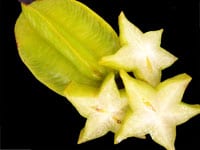Plantain is the common namefor herbaceous plants of the genus Musa. The fruit they produce is generally used for cooking, in contrast to the soft, sweet banana (which is sometimes referred to as the dessert banana). There is no formal botanical distinction between bananas and plantains, and the use of either term is based purely on how the fruits are consumed.
The population of North America was first introduced to the fruit as banana plantain, and in the United States andEurope “banana” generally refers to that variety. The word “banana” is sometimes used to describe other plantain varieties, and names may reflect local uses or characteristics of varieties: cooking plantain, banana plantain, beer banana, bocadillo plantain, etc.
Plantains are classified formally as Musa balbisiana or hybrids Musa acuminata × balbisiana, depending on their genomic constitution. The old scientific name Musa paradisiaca is no longer used. Most plantains come from the hybrid AAB and ABB Cultivar Groups.
All members of the genus Musa are indigenous to the tropical regions of Southeast Asia and Oceania, including the Malay Archipelago (modern Indonesia, Malaysia, Bruneiand the Philippines) and Northern Australia.
It is a close relative of banana, looks like banana, but bigger, longer, has thicker skin and often needs to be cooked before eaten.
It is sometimes called plantain banana and contains a low GI starch, excellent for weight control, slow energy release and good for diabetics, with surpassing nutritional value. It is eaten all over Africa and Southern and Central America. Plantain can be eaten boiled, roasted, grilled, or fried.
This fruit should not be confused with a small medicinal leafy herb known by the same name, but belonging to the Plantago family.
Unlike its banana cousin, plantain has more dietary fibers, less water and less sugar. It is rich in complex starch when unripe.
Health Benefits of Plantain
Plantains are a type of banana that contain less sugar than the common yellow banana. They are prepared similarly to vegetables being either fried or cooked. They are not suitable for eating raw unless they are very ripe. Plantains are low in sodium and high in vitamin A, potassium, and fiber. They contain similar nutritional content as bananas.

